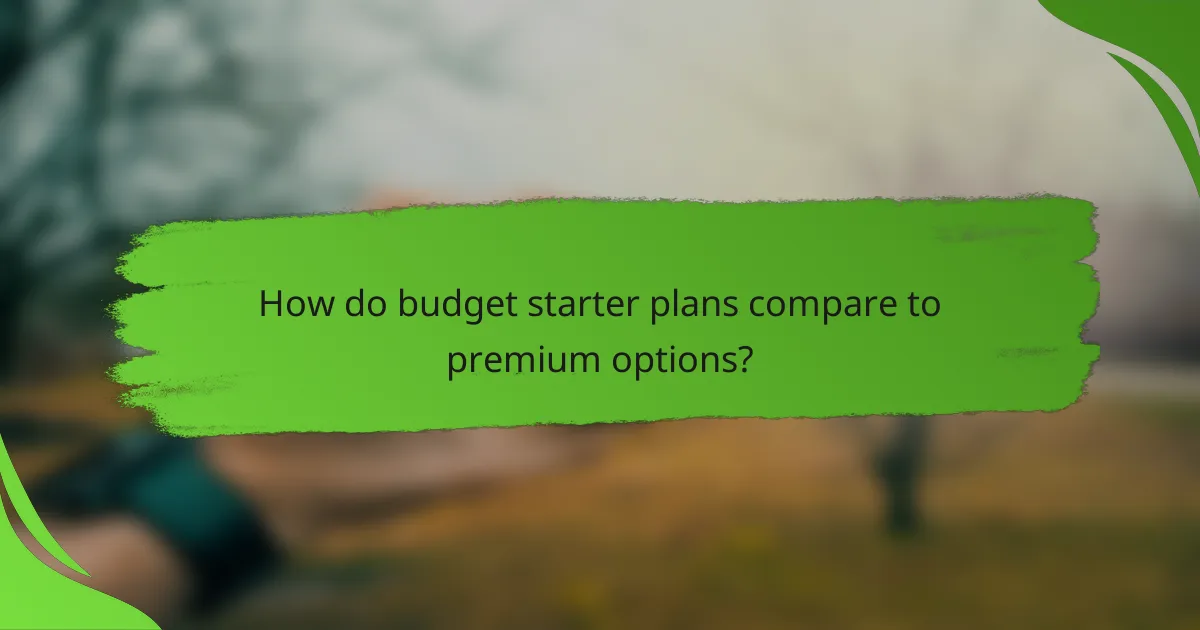Starter plans are an excellent choice for individuals or small businesses seeking budget-friendly options that include essential features. These plans provide a solid foundation for establishing an online presence while minimizing financial risk, making them accessible for those just starting out. With core functionalities and user-friendly interfaces, users can embark on their journey without a significant investment.

What are the best budget-friendly starter plans in Canada?
The best budget-friendly starter plans in Canada typically offer essential features at a low cost, making them ideal for individuals or small businesses just starting out. These plans provide a solid foundation for building an online presence without significant financial risk.
Basic Starter Plan by Shopify
The Basic Starter Plan by Shopify is designed for new e-commerce entrepreneurs looking to set up an online store quickly. For a monthly fee, users gain access to essential features like a website builder, payment processing, and inventory management.
This plan allows you to sell an unlimited number of products and offers 24/7 customer support. However, transaction fees apply unless you use Shopify Payments, so it’s essential to consider these costs when budgeting.
Essential Plan by Wix
The Essential Plan by Wix is a great option for individuals wanting to create a professional website without breaking the bank. This plan includes features such as a drag-and-drop editor, free hosting, and a domain name for the first year.
While it provides ample customization options, users should note that e-commerce capabilities are limited compared to higher-tier plans. It’s advisable to assess your needs carefully to ensure this plan meets your business goals.
Starter Plan by Squarespace
The Starter Plan by Squarespace offers a visually appealing platform for those looking to showcase their work or services online. This plan includes templates optimized for mobile devices, built-in SEO tools, and analytics to track website performance.
However, e-commerce features are restricted, making it less suitable for those who plan to sell products directly through their site. Consider your long-term objectives to determine if this plan aligns with your vision.

How do starter plans provide essential features?
Starter plans offer essential features at a budget-friendly price, making them ideal for individuals or small businesses. These plans typically include core functionalities, user-friendly interfaces, and basic customer support, allowing users to get started without significant investment.
Core functionalities included
Starter plans generally include basic functionalities necessary for operation, such as essential tools for communication, project management, or e-commerce. For example, a starter plan for a website builder may provide templates, hosting, and a domain name, all at a low monthly fee.
When evaluating core functionalities, consider what features are crucial for your needs. Look for plans that offer scalability, allowing you to upgrade as your requirements grow. This flexibility can save you from switching providers later.
User-friendly interfaces
User-friendly interfaces are a hallmark of starter plans, ensuring that even those with limited technical skills can navigate the platform easily. Intuitive designs and straightforward navigation help users quickly access the tools they need without extensive training.
When choosing a starter plan, prioritize platforms that offer a clean layout and easy onboarding processes. This can significantly reduce the time spent learning how to use the service, allowing you to focus on your projects instead.
Basic customer support
Basic customer support is typically included in starter plans, providing users with access to help when they encounter issues. This support may come in the form of email assistance, live chat, or access to a knowledge base with FAQs and tutorials.
While basic support is beneficial, be aware of its limitations. Response times may vary, and more complex issues might require an upgrade to a higher-tier plan for dedicated support. Always check the support options available before committing to a plan.

What are the risks associated with budget starter plans?
Budget starter plans often come with several risks that can impact their effectiveness for users. These risks include limited scalability, fewer customization options, and the potential for hidden fees, all of which can affect long-term satisfaction and usability.
Limited scalability options
Many budget starter plans are designed for small-scale operations, which means they may not easily accommodate growth. As your needs expand, you might find that the plan cannot support additional users, features, or increased data usage.
For example, if you start with a plan that allows for five users and your team grows to ten, you may need to upgrade to a more expensive plan. This can lead to unexpected costs and disruptions in service.
Fewer customization features
Budget starter plans typically offer limited customization options, which can restrict your ability to tailor the service to your specific needs. This lack of flexibility may hinder your ability to create a unique user experience or optimize workflows.
For instance, if you require specific integrations or branding elements, a starter plan may not provide the necessary tools, forcing you to compromise on functionality or aesthetics.
Potential for hidden fees
Many budget starter plans advertise low initial costs but may include hidden fees that can accumulate over time. These fees can arise from exceeding usage limits, needing additional features, or requiring customer support beyond basic assistance.
To avoid surprises, carefully review the terms and conditions of any plan. Look for details on usage caps, upgrade costs, and any charges for additional services to ensure you understand the total cost of ownership.

How to choose the right starter plan?
Choosing the right starter plan involves evaluating your business needs, comparing pricing structures, and reviewing customer feedback. A well-selected plan can provide essential features at a budget-friendly cost, minimizing risk while maximizing value.
Assess your business needs
Start by identifying the core functions your business requires. Consider factors such as the number of users, necessary features, and scalability options. For example, if you anticipate growth, look for plans that allow easy upgrades without significant cost increases.
Make a list of must-have features versus nice-to-have ones. This prioritization helps in narrowing down options that align with your budget while still meeting essential operational needs.
Compare pricing structures
Examine the pricing models of various starter plans, which can range from monthly subscriptions to annual payments. Some plans may offer tiered pricing based on usage, while others might include flat rates. Understanding these structures helps you predict long-term costs.
Look for hidden fees or additional costs for features that may seem included. For instance, some providers charge extra for customer support or advanced analytics, which can impact your overall budget.
Evaluate customer reviews
Customer reviews provide valuable insights into the reliability and performance of starter plans. Focus on feedback regarding user experience, customer support, and any recurring issues. High ratings in these areas often indicate a trustworthy service.
Check multiple review platforms to get a balanced perspective. Look for patterns in the reviews, such as common praises or complaints, which can guide your decision-making process effectively.

What are the prerequisites for starting with a budget plan?
To start with a budget plan, you need basic technical knowledge and an understanding of initial investment considerations. These prerequisites help ensure that you can effectively manage your finances while minimizing risks.
Basic technical knowledge
Having basic technical knowledge is crucial for navigating budgeting tools and software. Familiarity with spreadsheets or budgeting apps can streamline your planning process and improve accuracy.
Consider learning how to use common financial software, which can help you track expenses and income. Online tutorials and resources can provide valuable guidance in mastering these tools.
Initial investment considerations
When starting a budget plan, assess your initial investment needs, including any software or tools you may require. Budgeting apps often range from free to a few dollars per month, so choose one that fits your financial situation.
Additionally, consider any potential costs associated with your budgeting process, such as subscription fees or educational resources. Aim to keep these expenses low to maintain a budget-friendly approach while ensuring you have the essential features needed for effective planning.

How do budget starter plans compare to premium options?
Budget starter plans are designed to provide essential features at a lower cost compared to premium options, making them ideal for individuals or small businesses with limited resources. While they offer significant savings, these plans often come with trade-offs in terms of features and support.
Cost-effectiveness
Budget starter plans typically range from low tens to a few hundred dollars per month, depending on the service. This affordability allows users to access necessary tools without straining their finances, making it a practical choice for startups and freelancers. For example, a basic website hosting plan might cost around $5 to $15 monthly, while premium plans could exceed $30.
When evaluating cost-effectiveness, consider not just the monthly fee but also any hidden costs, such as setup fees or charges for additional features. Always read the fine print to avoid unexpected expenses that can diminish the overall savings.
Feature limitations
While budget starter plans provide essential functionalities, they often lack advanced features found in premium options. For instance, you may miss out on higher storage limits, enhanced security measures, or priority customer support. This can affect the scalability of your operations as your needs grow.
It’s crucial to assess whether the limitations of a budget plan align with your current and future requirements. If you anticipate needing more robust features soon, investing in a premium plan might save you from the hassle of switching providers later.
